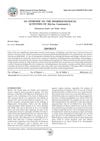 January 2010 in “Actas Dermo-Sifiliográficas”
January 2010 in “Actas Dermo-Sifiliográficas” A woman developed thick gums from everolimus treatment after a kidney transplant.
 August 2009 in “International Journal of Dermatology”
August 2009 in “International Journal of Dermatology” A postmenopausal woman's facial redness, acne, and excess hair were caused by too much hormone therapy for insomnia, but improved after stopping the treatment.
 January 2009 in “Side effects of drugs annual”
January 2009 in “Side effects of drugs annual” Some drugs can cause serious side effects like heart issues and nervous system problems, but certain drugs for Parkinson's and overactive bladder may be safer, though they still have some common side effects.
 January 2004 in “Side effects of drugs annual”
January 2004 in “Side effects of drugs annual” Certain skin drugs and topical agents, including some natural extracts and fragrances, can cause allergic reactions. Some hair dyes and extensions, as well as minoxidil, a hair growth treatment, can also cause allergies. Botulinum toxin A can effectively reduce sweat but may have temporary side effects.
 September 1999 in “The Journal of The British Menopause Society”
September 1999 in “The Journal of The British Menopause Society” The document concludes that skin aging in women can be caused by UV exposure and hormonal changes, and treatments like hormone replacement therapy and various skin therapies can help.
 July 1994 in “Annals of Pharmacotherapy”
July 1994 in “Annals of Pharmacotherapy” Cromolyn sodium's effectiveness for treating asthma in children under 2 is unclear, possibly more beneficial for older children, and further research is needed.
 April 1963 in “Archives of Dermatology”
April 1963 in “Archives of Dermatology” Dermatological conditions are complex and treatments often have mixed results.

Teprotumumab for thyroid eye disease commonly causes fatigue, brittle nails, dry eyes, hair loss, muscle spasms, and dry mouth, with rare serious events like blood clots.
 April 2024 in “Frontiers in pharmacology”
April 2024 in “Frontiers in pharmacology” Brepocitinib 30mg is most effective for moderate-to-severe alopecia areata, but ritlecitinib 50mg may offer a better balance of safety and effectiveness.
 March 2024 in “Advances in obstetrics and gynecology research”
March 2024 in “Advances in obstetrics and gynecology research” Combining hysteroscopy with Diane-35 improves outcomes and reduces recurrence of endometrial polyps.
 March 2024 in “Research Square (Research Square)”
March 2024 in “Research Square (Research Square)” Scalp cooling therapy helps preserve hair during chemotherapy for most patients.
 March 2024 in “Journal of drugs in dermatology”
March 2024 in “Journal of drugs in dermatology” HASHA is a safe and effective option for chin augmentation.
 February 2024 in “Curēus”
February 2024 in “Curēus” Long COVID is more common in those with severe initial infections, but not linked to blood group.
 February 2024 in “PloS one”
February 2024 in “PloS one” Tofacitinib and adalimumab are promising treatments for cicatricial alopecia with few side effects.
 January 2024 in “Journal of Ayurveda Campus”
January 2024 in “Journal of Ayurveda Campus” Psoralea corylifolia Linn. is a medicinal plant used for skin diseases and has various health benefits.

Henna has many medicinal uses but needs more research to confirm its benefits.
 October 2023 in “Dermatology practical & conceptual”
October 2023 in “Dermatology practical & conceptual” Many patients experienced hair loss after COVID-19, with women affected more, starting on average 49 days post-infection.
 October 2023 in “Clinical medicine and medical research”
October 2023 in “Clinical medicine and medical research” Thyroid function may influence hair loss after COVID-19.
 July 2023 in “International journal of pharmacognosy and life science”
July 2023 in “International journal of pharmacognosy and life science” The herbal hair oil made from various plants might be a good alternative to synthetic hair loss treatments.
 June 2023 in “Trichology and cosmetology:”
June 2023 in “Trichology and cosmetology:” Ageratum Conyzoides, when taken orally, can effectively reduce hair loss and improve hair growth.

Low vitamin D3 is not linked to different levels of thyroid hormones in people with autoimmune thyroid disease.
 January 2023 in “Indian Journal of Unani Medicine”
January 2023 in “Indian Journal of Unani Medicine” Common Myrtle is used in traditional medicine to treat various health issues.
 June 2022 in “Organic communications”
June 2022 in “Organic communications” Natural compounds, especially Withaferin-A, may help treat post-COVID-19 complications, but some may have side effects.

No single biomarker is reliable enough for diagnosing and assessing SLE.
 February 2022 in “International journal of KIU”
February 2022 in “International journal of KIU” Certain genes and nutrients like vitamin D, zinc, and omega fatty acids affect COVID-19 severity and infection risk.
 November 2021 in “Permskij medicinskij žurnal”
November 2021 in “Permskij medicinskij žurnal” Women with menstrual dysfunction often have deficiencies in magnesium, iron, and vitamin D.
 June 2021 in “Journal of emerging technologies and innovative research”
June 2021 in “Journal of emerging technologies and innovative research” Onion and Aloe vera can help protect hair from damage caused by hair dyes.
 August 2020 in “Revista de chimie”
August 2020 in “Revista de chimie” Nitroglycerin ointment is now used to treat several skin conditions with fewer side effects.
 June 2019 in “The Egyptian Journal of Fertility and Sterility”
June 2019 in “The Egyptian Journal of Fertility and Sterility” Chromium picolinate was better tolerated than metformin for PCOS with fewer side effects.
 November 2018 in “Springer eBooks”
November 2018 in “Springer eBooks” Children need early diagnosis and treatment for iron-deficiency anemia to prevent learning problems and promote health.






























